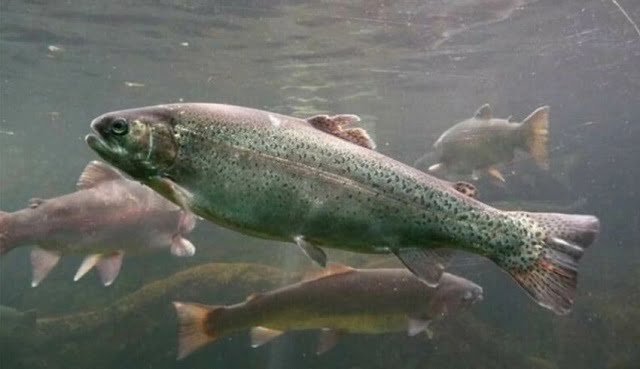
The aquaculture industry is facing a growing challenge: obtaining sustainable and nutritious feed for farmed fish. Fishmeal, a traditional staple, raises concerns about environmental impact.
A new study by scientists from the Norwegian University of Science and Technology, Nutrimar AS, the Norwegian Institute of Bioeconomy Research, and UiT the Arctic University of Norway suggests that replacing fishmeal (FM) with salmon protein hydrolysate (FPH) in the diets of Atlantic salmon post-smolts (Salmo salar) can improve intestinal health.
The research, conducted by a team of aquaculture experts, investigated the effects of FPH on gene expression and microbiota in salmon intestines. This innovative approach not only benefits fish health but also promotes sustainable aquaculture practices.
The challenge: feeding a growing industry
The salmon industry is booming, driven by increasing demand for healthy and delicious seafood products. However, this growth puts pressure on natural resources, particularly wild fish populations used to produce fishmeal, a key ingredient in salmon feed.
The solution: protein hydrolysate
Fish protein hydrolysate (FPH) offers a sustainable alternative. It is made by breaking down protein from fish byproducts such as salmon and trout, using what would otherwise be waste. FPH is produced using enzymes, a process that removes potential prions, harmful agents related to diseases in mammals but not in fish. This makes FPH a safe and eco-friendly option for salmon feed.
It is important to note that the protein hydrolysate process also eliminates possible prions, infectious proteins that can cause diseases in mammals but not in fish.
Why FPH?
- Sustainability: FPH uses waste generated by salmon farming, reducing dependence on wild fish populations.
- Nutrition: Hydrolysates are mixtures of peptides and easily digestible amino acids, essential components for fish growth.
- Potential health benefits: FPH may contain bioactive peptides with antimicrobial, anti-inflammatory, and immunomodulatory properties. Studies suggest that FPH can improve growth performance and immune response in fish.
The science behind the benefits
Researchers investigated the effects of partially replacing fishmeal with salmon FPH on the intestinal health of salmon. They fed Atlantic salmon post-smolts with a control diet containing 30% fishmeal (FM), a diet with 20% FM and 9% salmon hydrolysate (FPH-09), or a diet with 10% FM and 18% salmon hydrolysate (FPH-18).
Stay Always Informed
Join our communities to instantly receive the most important news, reports, and analysis from the aquaculture industry.
The results were impressive:
- Reduced inflammation: Salmon fed diets with higher levels of FPH showed lower expression of genes associated with intestinal inflammation. This suggests better intestinal health and potentially better overall fish welfare.
- The power of peptides: The study also explored the role of peptide transporters in the intestine. These transporters help absorb essential nutrients from digested proteins. Research suggests that specific transporters are more active in the anterior part of the intestine, while others contribute significantly throughout the digestive tract.
Microbes also matter
The billions of microbes living in the salmon intestine, known as microbiota, play a vital role in digestion, immunity, and overall health. Diet is an important factor influencing the composition of this microbial community.
While the overall composition of the salmon intestinal microbiota was not significantly affected by the diet, a higher prevalence of specific bacteria was observed in fish fed FPH. However, more research is needed to understand the possible connection between FPH, intestinal microbiota, and improved intestinal health.
Conclusion
“Replacing FM with salmon hydrolysate reduced the expression of inflammatory markers in the Atlantic salmon intestine, suggesting better health benefits,” concluded the scientists.
This study paves the way for a more sustainable and healthier future for salmon aquaculture. Replacing fishmeal with FPH reduces pressure on wild fish populations while potentially improving salmon intestinal health. Further research is being conducted to fully understand the impact of FPH on fish health and performance.
The study was funded by Nutrimar AS, the Norwegian Research Council, and the Feed2Food project.
Reference (open access)
Sandbakken, I. S., Su, H., Johansen, L., Zhang, Y., Ringø, E., Røsbak, R., Yakovlev, I., Five, K. K., & Olsen, R. E. (2024). Replacing fishmeal with salmon hydrolysate reduces the expression of intestinal inflammatory markers and modulates the gut microbiota in Atlantic salmon (Salmo salar). Frontiers in Marine Science, 11, 1376516. https://doi.org/10.3389/fmars.2024.1376516
Editor at the digital magazine AquaHoy. He holds a degree in Aquaculture Biology from the National University of Santa (UNS) and a Master’s degree in Science and Innovation Management from the Polytechnic University of Valencia, with postgraduate diplomas in Business Innovation and Innovation Management. He possesses extensive experience in the aquaculture and fisheries sector, having led the Fisheries Innovation Unit of the National Program for Innovation in Fisheries and Aquaculture (PNIPA). He has served as a senior consultant in technology watch, an innovation project formulator and advisor, and a lecturer at UNS. He is a member of the Peruvian College of Biologists and was recognized by the World Aquaculture Society (WAS) in 2016 for his contribution to aquaculture.







